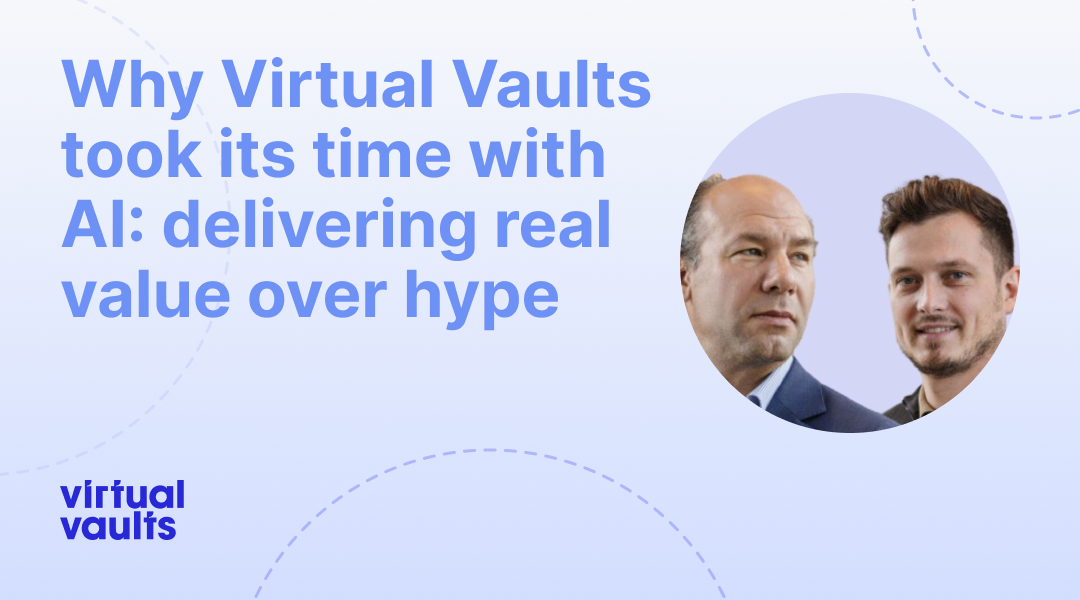Why Virtual Vaults Took Its Time with AI: Delivering Real Value Over Hype
A strategic look inside the minds of Virtual Vaults’ CEO and CPO - on why substance matters more than speed in M&A security innovation.

In a tech landscape driven by buzzwords and rapid deployment, Virtual Vaults took a different route, one defined by deliberate patience and a relentless focus on value. Join CEO Jeroen Kruithof and CPO Pepijn van de Vondervoort as they reveal the thinking behind Virtual Vaults’ measured approach to AI. In this deep dive, they explore why timing matters more than trend-chasing, how their AI Redaction Assistant reshapes compliance in mid-market M&A, and how a hybrid model of human and machine intelligence will define the future of smarter dealmaking.
“Deal strategy comes first. Inefficiency shouldn’t stand in the way, that’s why we built Virtual Vaults,” Kruithof explains. “We weren’t going to implement AI just because it was trendy. We waited until the tech could deliver true, tangible value for the people who rely on it daily. Now, our Redaction Assistant transforms compliance work into a strategic edge—without ever compromising on human control.”
From friction to focus: why the status quo wasn’t good enough
Kruithof’s story began in 1999, founding a legal due diligence firm laser-focused on deal preparation. Years in the field revealed systemic inefficiencies that slowed down even the best dealmakers. “I saw where time was lost, over and over again,” Kruithof says. “Virtual Vaults wasn’t born out of a love for technology. It was built to solve the real problems we faced every day. That mindset extended into digitization, where many providers merely patched new features onto legacy platforms. Virtual Vaults chose a different path. “Others avoided real innovation. We started from scratch, from the user’s point of view. Once we nailed the due diligence experience, we realized the real opportunity lay in automating deal preparation itself.” CPO Van de Vondervoort agrees: “Better preparation changes the course of a deal. It puts you in control, giving clarity, insights, and the conditions to drive maximum value.”
The right AI at the right time
In M&A, timing is everything, and that includes adopting technology. Dealmakers tend to delay preparation until pressure forces action. In such a risk-averse industry, new tools must be not only secure but also seamlessly adoptable. Virtual Vaults saw AI’s potential early, but intentionally waited until it met their exacting standards. “We tested AI and machine learning for years,” Van de Vondervoort explains. “But it wasn’t ready, until now.” They didn’t want to replace human judgement. They wanted to enhance it. “Reputation, relationships, accountability, those matter deeply in M&A. So AI needed to work with users, not around them. That’s why we partnered with Microsoft Azure and OpenAI, to ensure our Redaction Assistant fits into existing workflows with enterprise-grade security at its core.” Kruithof is clear about the product’s purpose: “This isn’t automation for the sake of it. AI is an assistant that is born ready-made and always on. It accelerates what’s repetitive but leaves decisions where they belong, with the expert.”
Secure, smart, and designed for the mid-market
Historically, redaction was expensive and manual, especially for mid-market firms, who often accepted the cost of legal reviews as a necessary burden. Meanwhile, critical documents were still being exchanged via unsecured email. Virtual Vaults aimed to close that gap with a tool that was practical, affordable, and built with user habits in mind. From the start, the AI Redaction Assistant was developed with real users, especially during document collection phases, to ensure intuitive adoption. Through early access previews and user feedback loops, the tool rapidly improved and saw widespread adoption.
The Assistant now automatically identifies sensitive content, such as PII or commercially sensitive terms, and suggests redactions, categorized for review. Users can accept, modify, or skip suggestions, blending AI automation with manual input in a single, streamlined interface.
“Compliance remains non-negotiable, even for leaner teams,” Van de Vondervoort notes. “We’re giving mid-market dealmakers access to the kind of precision normally reserved for enterprise tools.” Kruithof adds: “What used to take days now takes minutes. That’s real ROI, real value.”
Looking ahead: from redaction to autonomous dealmaking
Virtual Vaults continues to push forward, always with the same principle in mind: if it’s not useful, it’s not ready. The next frontier? AI-supported due diligence that filters and highlights risks, freeing humans to focus on strategy. “We’re heading toward smarter due diligence, not to replace experts, but to empower them,” says Kruithof. “AI will help create consistency and sharper focus in early stages.” Van de Vondervoort envisions the long-term future: “Eventually, dealmakers will only decide: do we buy or not? Everything leading up to that moment, risk analysis, flagging red flags, accelerating data review, will be assisted by AI. That’s how you get faster, safer decisions.”
No gimmicks. Just real innovation.
Virtual Vaults is choosing evolution over explosion; delivering only what makes a difference. “We’re not chasing trends,” Kruithof concludes. “We’re building tools that dealmakers truly need. Innovation should work for people, not the other way around.”
Visit Virtual Vaults to learn more.
This article was originally published on Insider Media on May 5th 2025.
